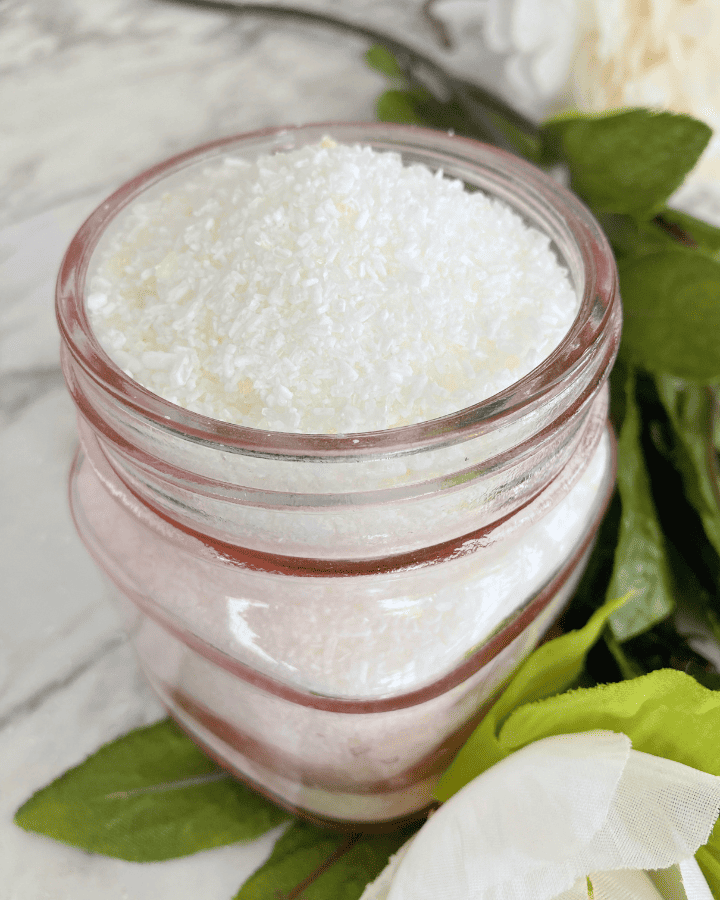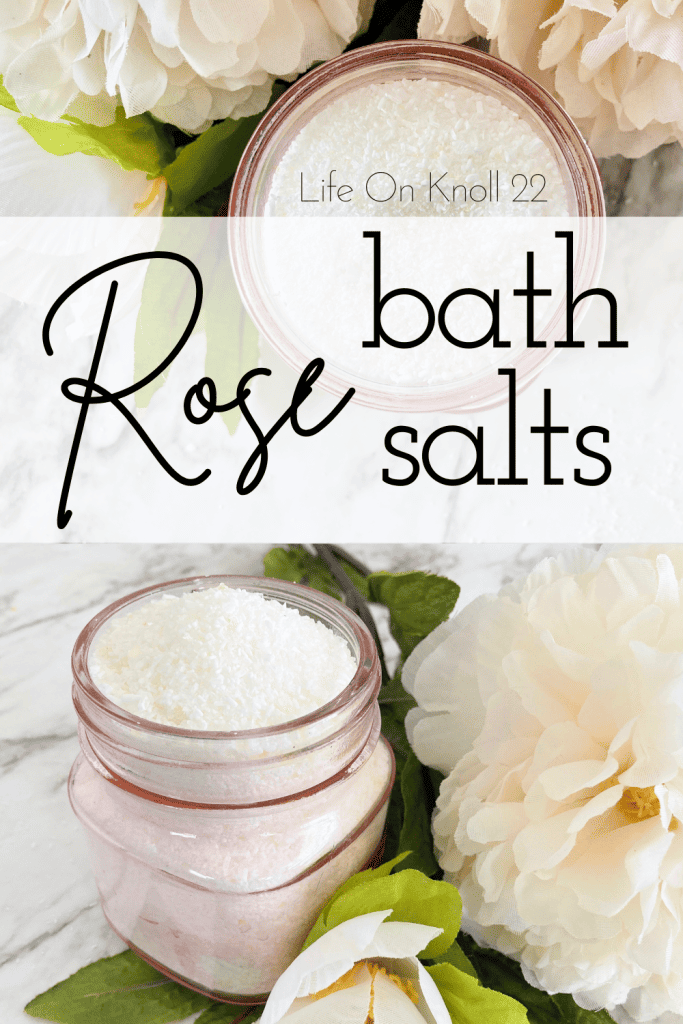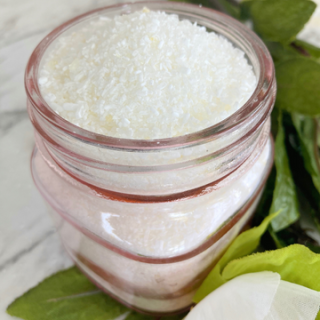Make this rose bath salts recipe with only two ingredients, and you’ll be quickly on your way to a relaxing soak.

Rose Essential Oil
Rose essential oil is a natural oil extracted from the petals of a rose flower. This oil has been shown to have many beneficial properties, especially when used by women. Perhaps this is why it is commonly used in perfumery. Besides its pleasant smell, rose oil can help combat depression and anxiety, by boosting your mood and encouraging relaxation. Plus, during that especially difficult time of the month, aroma therapy using rose oil may offer pain relief and encourage “feel good” hormones. It also boasts skin wellness benefits such as acne control and anti-aging support because it is rich in antioxidants.
Benefits of Epsom Salt
Magnesium sulfate (MgSO4), commonly known as epsom salt, has been used for centuries to address a variety of ailments. Many of these benefits are associated with the magnesium content in this salt.
The difference between this salt and common table salt (sodium chloride, NaCl) should be noted. Their are many compounds within the category of “salts” based on their chemical structures
Nutrient Deficiencies
The “ums”, as I like to call them, (magnesium, potassium, calcium) are a group of compounds that most people don’t intake enough of. In fact, in my research of the main nutrient deficiencies in the United States, magnesium ranks on every list, along with other biggies like Vitamin D, calcium, B12, dietary fiber, and iron.
If I’m having any muscular issues, (twitching, tightness, soreness, Charlie horses, etc.) my first self-diagnosis is always either dehydration or a missing “um”. Likely both.
Benefits of Magnesium
Oh let me count the ways. In addition to addressing muscular issues, as I noted above, magnesium has also been well documented to aid in several other bodily systems.
Sleep
Low levels of magnesium have been linked to poor sleep quality.
Stress
Magnesium has been suggested to benefit the neurotransmitters in your brain, thereby aiding in stress management.
Constipation
A common use for internal consumption of epsom salt is the aid in “the go”. Many over the counter laxative products contain magnesium
Reason for a Loooong Soak in Rose Bath Salts
When epsom salt is dissolved in water, it breaks apart into magnesium and sulfate ions. While there is some debate, it is commonly accepted that these magnesium ions can be absorbed through the skin during your bath. Multiple sources sited various reasons for soaking at least 20 minutes, with many recommending 40 minutes to receive maximum benefit from a magnesium soak, supported by claims of cell saturation, letting out toxins, etc. At very least, I recommend you should plan to soak a minimum of 15 minutes to gain the benefits of the aromatherapy and heat.
Rose Bath Salts
Combine these qualities of rose oil and epsom salt with the added benefit of a quiet soak in warm water and you have a winning combination.
Rose Essential Oil
Rose essential oil is quite expensive, and mine was given to me as a gift from a family member. You could choose to substitute any other essential oil or fragrance oil in this recipe.
Rose Bath Salts Recipe
Ingredients:
- Epsom Salts
- Rose Essential Oil
Directions:
Stir together 4 cup of epsom salts and 4-8 drops of rose essential oil in a small bowl.
Store in an air tight container or use immediately.
To Use:
Dissolve two-four of salts in your bath water. Enjoy a warm soak. I recommend at least 20-40 minutes to gain the most benefit.

Pin It For Later!


Rose Bath Salts Recipe
Make this rose bath salts recipe with only two ingredients, and you'll be quickly on your way to a relaxing soak.
Ingredients
- epsom salt
- rose essential oil
Instructions
Directions:
- Stir together 4 cup of epsom salts and 4-8 drops of rose essential oil in a small bowl.
- Store in an air tight container or use immediately.
To Use:
- Dissolve two-four cups of salts in your bath water. Enjoy a warm soak. I recommend at least 20-40 minutes to gain the most benefit.

Leave a Reply